1. A LETTER TO V. I. LENIN.
Comrade Lenin.
During the past three days I have had the opportunity to read the symposium: A Plan for the Electrification of Russia.1 My illness made this possible (it's an ill wind that blows nobody any good!).
An excellent well-compiled book. A masterly draft of a really single and really state economic plan, not in quotation marks. The only Marxist attempt in our time to place the Soviet superstructure of economically backward Russia on a really practical technical and production basis, the only possible one under present conditions.
You remember Trotsky's "plan" (his theses) of last year for the "economic revival" of Russia on the basis of intensive labour by unskilled peasant-worker masses (Labour Army) in the remnants of pre-war industry. How wretched, how backward, compared with this GOELRO plan! 2 A medieval handicraftsman who fancies himself an Ibsen hero called to "save" Russia by an ancient saga...
And of what value are the dozens of "single plans" which to our shame appear from time to time in our press—the childish prattle of preparatory-school pupils... Or again, the philistine "realism" (in fact Manilovism 3 ) of Rykov who continues to "criticize" the Goelro and is up to his ears in routine...
[...]
Yours,
Stalin
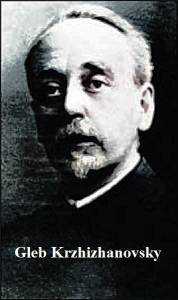
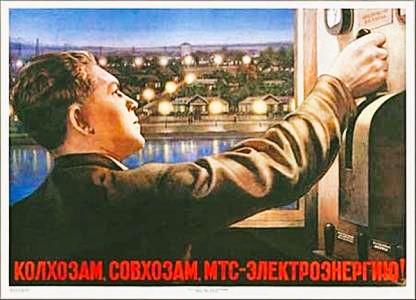
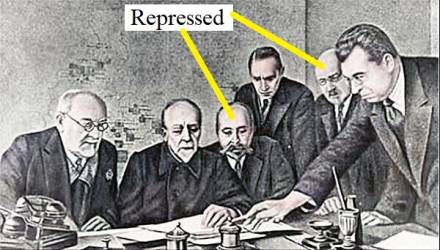
2. GREETING TO THE FIRST CONGRESS OF HIGHLAND WOMEN.1
Convey my fraternal greetings to the First Congress of Working Women of the Highland Republic.2 I deeply regret my absence owing to ill health.
Comrade Highland Women,
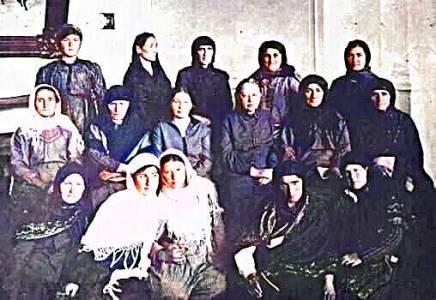
Not a single important emancipation movement in the history of mankind failed to have women actively involved, for every step that an oppressed class takes on the road to emancipation improves the lot of women simultaneously. The movements for the emancipation from slavery in ancient times and from serfdom in modern counted not only men in their ranks but women also—fighters and martyrs whose blood sealed their devotion to the toilers' cause.
Presently the emancipation movement of the proletariat—the most radical and powerful of all emancipation movements—has brought to the fore not only heroines and female martyrs but also a mass socialist movement of millions of working women who are fighting victoriously under a common proletarian banner. Compared to this mighty movement of working women the liberal movement of bourgeois female intellectuals is child's play, dawdling.
I am convinced that the Congress of Highland Women will conduct its proceedings under the Red Flag.3
Stalin
June 17, 1921
3. THE IMMEDIATE TASKS OF COMMUNISM IN GEORGIA AND TRANSCAUCASIA.1
[...]
The point is that by the will of history the Soviet power has triumphed not in the more highly developed countries but in relatively less-developed ones from a capitalist perspective. History has shown that it is much easier to overthrow the bourgeoisie in countries like Russia where capitalism is relatively young, the proletariat strong and numerous and the national bourgeoisie weak, than it is in the classical countries of capitalism like Germany, Britain and France where capitalism has survived for several centuries and the bourgeoisie is a mighty force that controls all social life.
[...]
Since Soviet countries own abundant raw materials and fuel while the industrial bourgeois countries suffer a shortage, some companies of bourgeois states will undoubtedly wish to sign agreements with Soviet states for the exploitation of those sources of raw materials and fuel on definite commercial terms. On the other hand, since the Soviet peasantry needs manufactured goods (textiles, tractors, etc.) it doubtlessly wants to conclude an agreement with the proletarian government for their acquisition (on barter terms).
The Soviet Government, for its part, wants to sign temporary agreements both with foreign capitalist concerns and with its own petit bourgeoisie, for such agreements will undoubtedly spur and fuel the restoration of the productive forces obliterated by the war and abet the country's electrification which is technological foundation of the future socialist economy.
These circumstances dictate to the Communists of Soviet states a policy of concluding temporary agreements both with foreign capitalists in the West and with the petit bourgeoisie at home.
Some people may object that such tactics smack of Menshevism, for the Mensheviks too conclude agreements with the bourgeoisie. But that is not correct. There is a wide gulf separating our tactics of concluding agreements with foreign capitalists and Menshevik tactics of concluding agreements with the bourgeoisie. Mensheviks usually propose agreements with the bourgeoisie to bolster Menshevik influence when capitalists hold the reins of power. This corrupts the proletariat because domineering capitalists are not averse to handing down "reforms" or small concessions to individual workingman unions, thus sowing dissension in and splitting the ranks of the proletariat. That's precisely why the Bolsheviks always opposed and will always oppose Menshevik tactics of concluding agreements with the bourgeoisie when these are in power. That's precisely why the Bolsheviks regard the Mensheviks as purveyors of bourgeois influence to the proletariat.
In contrast to Menshevik tactics the Bolshevik tactics of concluding agreements with the bourgeoisie presuppose that the proletariat, not the bourgeoisie, holds the reins of power. The inevitable result of agreements now is the strengthening of proletarian power on the one hand and the dismantling of bourgeois power—the taming of some groups—on the other. The proletariat need only hold fast to the power it has won and make a skilful use of bourgeois resources and knowledge for the economic revival of the country.
You see that these tactics and the Menshevik tactics are as far apart as heaven and earth.
[...]
4. THE PARTY BEFORE AND AFTER TAKING POWER.
[...]
An entirely different picture is presented by the third period, the one we are in now.
The third period is the period of taking and holding power with the object, on the one hand, of drawing all the working people of Russia into the work of building the socialist economy and the Red Army, and, on the other hand, of applying all forces and resources for rendering assistance to the international proletariat in its attempt to overthrow Capital. This period embraces the interval of time from October 1917 to the present day.
The fact that the proletariat of Russia took power has generated an aura both internationally and within Russia never before seen.
To begin with, October 1917 marked a breach in the world social front and created a turn in the whole of world history. Picture to yourselves first the boundless social front stretching from the backward colonies to advanced America, and then the immense breach made in this front by the Russian detachment of the international proletariat, a breach that menaces the existence of imperialism, that has upset all plans of the imperialist sharks and has greatly, radically, eased the task of the international proletariat in its struggle against Capital. Such is the historical significance of October 1917.
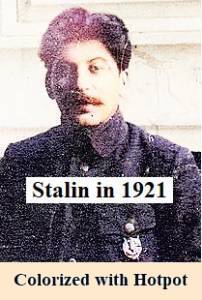
From that moment our Party was transformed from a national force into a predominantly international force, and the Russian proletariat was transformed from a backward detachment of the international proletariat into its vanguard. Henceforth the tasks of the international proletariat are to widen the Russian breach, to assist the brave vanguard that has broken through, to prevent the enemies from surrounding it and cutting it off from its base. The task of international imperialism, on the contrary, is to close the Russian breach, to close it without fail. That's why our Party, if it wants to retain power, pledges itself to do "the utmost possible in one (its own—J. St.) country for the development, support and awakening of the revolution in all countries" (see Lenin's book, The Proletarian Revolution and the Renegade Kautsky). That's why our Party has since October 1917 been transformed from a national into an international force, into the Party of revolution on an international scale.
An equally radical shift has taken place in the Party's stance inside the country as a result of October 1917. In the previous two periods the Party was an instrument for destroying the old order, for overthrowing Capital in Russia. Now, on the contrary, the Party has been transformed from a party of revolution inside Russia to a party of construction, to a party bent on creating new economic relationships. In the past the Party recruited the best forces of the working class for the purpose of storming the old order; now it recruits them for the purpose of organizing the food supply, the transportation system and the basic industries. In the past the Party rallied the revolutionary elements of the peasantry for the purpose of overthrowing the landlords; now it recruits them for the purpose of improving agriculture, of consolidating the alliance between the toilers of the countryside and the proletariat which holds power. In the past the Party recruited the best elements of the belated nationalities for the struggle against Capital; now it recruits them for the purpose of bonding the life of those toilers with the life of the Russian proletariat. In the past the Party wrecked the Army, the old militarist army; now it raises a new workers-and-peasants Army for the purpose of protecting the gains of the revolution from external enemies.
The Russian Communist Party has been transformed from a party of revolution within Russia to a party of peaceful construction. That's why it has removed from the arsenal of the proletariat such forms of struggle as strikes and insurrection, which are now unnecessary in Russia.
[...]
5. THE TWELFTH CONGRESS OF THE RUSSIAN COMMUNIST PARTY.1
[...]
I pass to the first part of the report.
I speak of our Party as the vanguard and of the working class as the army. It may seem from this analogy that the relationship mirrors the military sphere, i.e., the Party issues orders, slogans are sent out via telegraph, and the army, i.e., the working class, carries them out. Such a view is radically wrong.
The point is that political matters are much more complex. Military commanders themselves create and enrol the Army, but in the political sphere the Party finds the army ready-made. That army is the working class. The second difference is that military commanders supply the Army with food, clothing and footwear. That's not the case in the political sphere. The Party does not supply food, clothing or footwear to the working class.
For that very reason it's not the class that depends on the Party but vice versa. That's why if the vanguard of the class, i.e., the Party, is to exercise leadership politically it must avail itself of a broad network of non-Party mass apparatuses that will act like antennae with which the Party transmits its will to the working class, and this one is changed from an amorphous mass into the army of the Party.3
[...]
But there is one question that we have discussed several times in the Central Committee and which caused at one time serious controversy: the enlargement of the Central Committee. Some Central Committee members are of the opinion that the Central Committee should not be enlarged but, on the contrary, reduced. I shall not give their reasons; let the comrades speak for themselves. I shall briefly give the reasons for enlarging it.
The present state of affairs is as follows. We have twenty-seven members on the Central Committee of our Party. It meets once every two months. A core of ten to fifteen members have become so skilled in directing political and economic work that they are in danger of becoming "High Priests" in the art of leadership. This may be a good thing, but it hides a very dangerous side effect: these comrades with a lot of experience may become infected with hubris, isolate themselves and shun work among the masses.
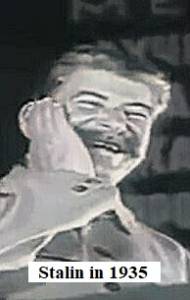
It's a very good thing if some members of the Central Committee or the core of fifteen, say, have so much experience and are so skilled that they make no mistakes in nine out of ten cases drawing instructions. But if they are not accompanied by a new generation of future leaders active in local work, chances are very high that these highly-skilled men will become ossified and divorced from the masses.
Secondly, the Central Committee core with a lot of experience in the art of leadership is growing old. We must have people who can take their place. You all know about Vladimir Ilyich's health. You know that these other members are also pretty well worn out, but we do not yet have new cadres to take their place.
The training of Party leaders is a very difficult task. It requires five to ten or more years. It's much easier to conquer a country with the aid of Comrade Budyonny's cavalry than it is to train two or three leaders from the rank-and-file capable of becoming real leaders of the country. And it's high time to think about training young leaders to take the place of the old.
There is only one way of doing this, namely, to draw new fresh forces into the work of the Central Committee and to promote the most capable and independent in the course of their work, those whose heads are screwed on the right way. Leaders do not spring out of books. Books help but do not forge leaders; the leading workers mature only through toil.
Only by electing new members to the Central Committee, by letting them bear the entire burden of leadership, will we be able to train the replacements we need so much in our current circumstances. That's why I think the congress would make a profound mistake if it rejected the Central Committee's proposal to expand this central organ of the Party to at least forty members.4
[...]
[...]
First I shall say a few words about the critics of the Central Committee's report.
About Lutovinov. He is displeased with the regime in our Party: there is no free speech in our Party, no legality, no democracy.
He knows of course that never in the past six years has the Central Committee prepared for a congress as democratically as it prepared for this one. He knows that immediately after the February plenum the members and candidate members of the Central Committee dispersed to all parts of our federation and delivered reports on the work of the Central Committee. Lutovinov must know that four issues of the Discussion Sheet 5 were printed and there the Central Committee's activities are analyzed and interpreted quite at random. I repeat, at random.
Withal that's not enough for Lutovinov. He wants "real" democracy, he wants to have all major questions at least discussed in all the Party units, from the bottom up, he wants the whole Party involved on every question and discussion.
But, comrades, now that we are in power, now that we have no fewer than four hundred thousand Party members and no fewer than twenty thousand Party units, I wonder what the implementation of that demand would lead to. The Party would become a debating society, eternally talking—and deciding nothing. Our Party must be above all a party of action for we are in power.
Furthermore Lutovinov forgets that although we hold power within the boundaries of the federation and enjoy all the advantages of legality domestically, internationally we are going through a phase similar to 1912 when the Party was semi-legal or illegal, when the Party had a few legal footholds like the Duma bench, legal newspapers and clubs, but was simultaneously surrounded by enemies as it strove to amass forces, to move forward and to broaden the legal cover.
Presently we live in a similar period on the international scale. We are surrounded by enemies, that's evident to everybody. The imperialist wolves around us are wide awake. Not a moment goes by without them trying to land some gap to crawl through and do us harm.
There are no grounds for asserting that our enemies do not prepare a blockade or an intervention. Such is the situation. In such a situation is it proper to discuss all questions of war and peace in public? To discuss any question in twenty thousand Party units is tantamount to discussing it in public. [...] What would happen to us if we were to discuss issues of war and peace—the most important of all important issues—publicly? For I reiterate, any discussion across twenty thousand units is tantamount to a public discussion. We would be smashed in no time.
It is obvious, comrades, that for organizational and political reasons Lutovinov's so-called democracy is a fantasy, democratic Manilovism. It's deceitful and dangerous. Lutovinov's road is not ours.
I pass on to Osinsky. He pounced upon a phrase of mine where I said that we must get independent people on the Central Committee. Yes, yes, Sorin, independent but not freelancers. Sorin [instead of "Osinsky"—EFC] thinks that I established some sort of link here with Osinsky, with democratic centralism.6
I did say that the Central Committee should be reinforced with independent comrades. I did not specify independent of what, knowing in advance that it's unwise to deal exhaustively with all points in the main speech, that something should be left for the reply to the discussion.
(Laughter. Applause)
We need independent people in the Central Committee, but not people independent of Leninism—no, comrades, God forbid! We need independent people, people free from personal influences, free from the habits, struggle and traditions of the Central Committee which sometimes provoke anxiety.
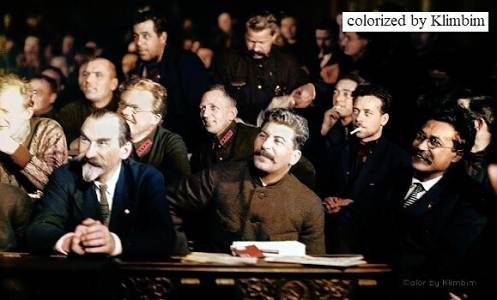
You remember Comrade Lenin's article. He says in it that we are faced with the prospect of a split.7 Since that passage in Comrade Lenin's article might have caused the units to think that a split is maturing in the Party already, the Central Committee members unanimously decided to dispel all doubts that might arise and stated that there is no split in the Central Committee. This quite concords with the facts. But the Central Committee also stated that the prospect of a split is not excluded. That too is quite correct.
Over the past six years the Central Committee has acquired (and was bound to acquire) certain habits and traditions of struggle which sometimes foster a somewhat unhealthy atmosphere. I did feet it in one of the last plenary meetings of February, and I remarked then that the intervention of people from the districts often decides a conflict.
We need people devoid of those traditions and personal influences in order that, on becoming Central Committee members, bringing into it the experience of practical work and contact with the districts, they should serve as the mortar, so to speak, that cements the Central Committee into a single indivisible collective body leading our Party. We need such comrades devoid of the old Central Committee traditions, people who will introduce a new refreshing element which will cement the Central Committee and avert any likelihood of a split. That's what I meant when I spoke about independent people.
Comrades, I cannot ignore the thrust that Osinsky made at Zinoviev. He praised Comrade Stalin, he praised Kamenev but kicked Zinoviev, calculating that it'll be enough to get rid of one for the time being and let the others' turn come later.8
He has set out to disrupt the core of the Central Committee formed through the years in order to pull it down gradually, bit by bit. If Osinsky seriously ponders pursuing that goal, if he seriously ponders launching similar sallies against core members of our Central Committee, I must warn him that he will collide with a wall which, I am afraid, will crack his head open.
Lastly about Mdivani...
[...]
I pass on to the second part of my reply to the discussion, to the organizational proposals submitted by the Central Committee. As far as I know, no speaker at this congress has criticized any. I take this to mean full agreement with those proposals. Still I would like to help and move a number of amendments. I shall submit them to the Organizational Committee where Comrade Molotov will be in charge of Party affairs and Comrade Dzerzhinsky in charge of Soviet affairs.
The first amendment is to raise the number of candidate members of the Central Committee from five to at least fifteen.
[...]
And the fourth amendment concerns the press. I would like the congress to pay particular attention to the task of lifting it to a proper level. The press has made big progress but it's not enough; the press must grow day in and day out. It is our Party's sharpest and most powerful weapon.
In conclusion a few words about this congress.9
Comrades, I must say that I have not seen for a long time so united a congress and inspired by a single idea as this one is.
I regret that Comrade Lenin is not here. If he were he would be able to say, "I tended the Party for twenty-five years and made it great and strong."
(Prolonged applause)
6. THE FIFTH ANNIVERSARY OF THE FIRST CONGRESS OF WORKING WOMEN AND PEASANT WOMEN.1
Five years ago the Central Committee of our Party convened the First All-Russian Congress of Working Women and Peasant Women in Moscow. Over a thousand delegates representing no fewer than a million women toilers gathered. That congress was a landmark in our Party's work among women toilers. The inestimable merit of that congress was that it laid the foundation for organizing the political enlightenment of the working women and peasant women of our Republic.
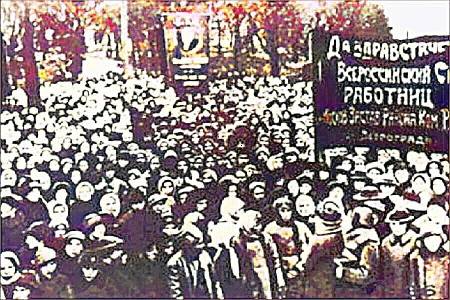
Some people might think that there is nothing exceptional about it, that the Party has always engaged in political enlightenment of the masses, including women. The political enlightenment of women cannot be of great importance since we have joint cadres of workers and peasants.
That opinion is radically wrong. Now that power has passed into the hands of the workers and peasants, the political enlightenment of women toilers is a matter of paramount importance.
And for the following reasons.
Our country has a population of about 140,000,000 people; no fewer than half are women, mainly worker and peasant, who are downtrodden uunenlightened and ignorant. Since our country has set to work earnestly building the new Soviet life, is it not obvious that women, half the population, will hobble every step our country takes if they remain downtrodden unenlightened and ignorant?
The working woman stands side by side with the working man. Together they undertake the common task of building our industry. She can be of assistance if she is politically conscious, politically enlightened. But she may wreck the common task if she is downtrodden and ignorant—wreck it not maliciously, of course, but out of ignorance.
The peasant woman stands side by side with the peasant. Together they undertake the common task of improving our agriculture, making it prosper, flourish. She can be of tremendous assistance if she discards her ignorance. On the other hand she may hinder the undertaking if she remains captive to ignorance.
Working women and peasant women are free citizens equal to working men and peasants. They take part in elections to our Soviets and co-operatives and they can be candidates themselves. The working women and peasant women can improve our Soviets and co-operatives, strengthen and improve them if they are politically enlightened. But they can weaken and undermine them if they are ignorant.
Lastly working women and peasant women are mothers; they are rearing our youth, our country's future. They can either warp a child's soul or rear for us a younger generation of healthy minds who can make our country progress, depending on whether the mothers sympathize with the Soviet system or whether they follow in the wake of the priests, the kulaks, the bourgeoisie.
[...]
7. LENIN'S SUCCESSOR.
Lenin is no longer the referee of Russia's destiny; for some time his acolytes have not veiled the fact that the Red tyrant would shortly depart the political scene due to his infirmities. The Council of People's Commissars has just made the chairman's resignation public with an official communiqué that simultaneously appoints Mr. Kamenev (whose real name is Rosenfeld) president of that council.
According to a telegram from Moscow the supreme authority of Soviet Russia now rests with a triumvirate made up of Kamenev, Rykov and Stalin. In one of our previous letters we recounted the character traits of the three. Kamenev and Rykov represent Lenin's moderate leaning whereas the Georgian represents the left wing, he is a friend of Bukharin and Dzerzhinsky the head of the Cheka, i.e., a fanatic adherent of implacable dictatorship and terror.
Will these three men be of one accord for long?
The fact that Kamenev, the most moderate of the Red dictators, has been given the supreme post of the Soviet Republic is very interesting. Trotsky and Zinoviev, the most oustanding figures of Bolshevism after Lenin, have been eclipsed. In the first place because of the antipathy their unrestrained despotism stirred in many of their admirers, and in second place, for belonging to the faction that learned nothing from the communist experiments and persist in absolute obduracy. As Lenin once remarked, they remind one of parrots which after learning to say, "What fine weather!" keep repeating the phrase even when it's raining cats and dogs.
Lenin understands, like Kamenev and Rykov, that the Red dictatorship foundered in a lamentable fashion. The grandiose reforms which the Communsts pretended to amaze the world with yielded absolute ruin, plunged the country in a state of misery unbeknown to History.
Lenin himself acknowledged this publicly in recent articles when making a balance of the work done. Despite having inflicted cruel terror the Bolsheviks were not able with their doctrines to attract the peasant masses, among whom the hostility toward the communist regime rises day by day. In a country where peasants make up 85% of the population that attitude portends a death verdict for communist ideas. The working class, in whose name the destruction was wrought, is also unhappy. Starving, recast as slaves without rights, the workers curse communism and dream only of a return of former owners to the factories. As regards intellectuals, reduced in a great proportion to begging, they are genuine pariahs cruelly persecuted by the Red dictators.
Production is completely ruined. A huge number of factories had to shut down and the ones still functioning produce only 7% of their pre-war output. Famine still wreaks havoc in the population. Epidemics become more frequent by the day and the lack of doctors and medicines is almost total. The health of state revenues is wretched. One million rubles are currently worth less than one pre-war ruble. Schools lie vacant due to the dearth of teachers, textbooks, paper, etc.
Such is the balance of the communist experiment: absolute ruin. Lenin frankly acknowledged in the last days of his political career the incapacity of his party to work constructively. To salvage the situation he proclaimed the need of steering the State flagship onto another course of action, and the so-called "new economic policy" was launched. This one consists in the complete renunciation of the communist creed. The nationalization of land and estates, the workers' inspection in factories, the election of Army commanders by soldiers, and all other reforms of a similar nature, were annulled and a new era proclaimed: state capitalism, a front for the return to capitalism pure and simple. Doors were thrown wide open to former capitalists and parvenus. A new bourgeoisie arose, far more rapacious, covetous and cynical than the old one.
Meanwhile the Bukharins and Trotskys keep stammering the communist ABC, not from conviction but from fear of losing their high rank if the new trends are given free rein. They understand that capitalism and economic development are not compatible with Red despotism.
The appointment of Kamenev as Lenin's successor evinces the victory of the more reasonable and moderate elements. Bolshevism is evolving and gradually forswears itself until only its name survives. The bourgeoisie settle in Russia on a sure footing, and on some morrow, perhaps not distant, will be the true lord of the country and with a kick demolish all the figurines and charlatans of the bankrupt and thousandfold baleful system of government by cannonade.
N. Tasin.1
The news arriving from Moscow concerning who will succeed Lenin in the presidency of the Council are contradictory and make it very difficult to define a clear picture. The choice of Kamenev is apparently not settled; in other words, it will be quite difficult yet to fill the vacancy left by the ailing dictator.
The succession is marred by the fact that the three Bolshevik figures of great prestige, after Lenin of course, namely, Trotsky the Commissar of War and the Navy, Zinoviev the dictator of Petrograd and the chairman of the Third International, and Kamenev the chairman of the central Moscow Soviet, are Israelites (Lenin is Orthodox). It is feared on solid grounds that appointing any one of them to the presidency of the Council of People's Commissars will exacerbate antisemitic sentiment already quite pronounced.1
Naming a triumvirate composed of the three aforementioned personalities would of course incur a greater hazard, and for this reason, some pundits suggest a triumvirate of Stalin, Rykov and Kamenev, the first two being Christians. But Stalin took part in the famous Bank of Tiflis robbery, and it's esteemed that his presence at the helm of the Government would certainly not contribute to inspire confidence toward Russia in the minds of foreign capitalists. The moderates (Krassin's group) posit the health of Russia exclusively on the broad participation of foreign capital in the reconstruction of the country and are therefore opposed to Stalin. On the other hand, the extremists brand Rykov "too bourgeois."
Bukharin the newspaperman, academician and economist has considerable reputation, but he is regarded as the leader of the "Bolshevik Lefts" and more a theoretician than a practical man.
Tsyurupa, "Deqenko" (?), Krylenko, "Beizenko" (?) are less important. Rakovsky, Béla Kun, Unszlicht and Dzerzhinsky are foreigners.
Indications are that Lenin's death will open a greater rift in Bolshevik ranks than was originally thought.
Thirty years earlier Stalin himself wrote down this accidental but revealing remark in his "Notes of a Delegate" to the Fifth Party Congress held in London between April 30 to May 19, 1907,It has not yet been forgotten, I trust, that anti-Semitism was quite widespread in Czarist Russia among peasants, the urban petty bourgeoisie, the intelligentsia and the more backward strata of the working class. "Mother" Russia was renowned not only for her periodic Jewish pogroms but also for a considerable number of anti-Semitic publications with a wide circulation. The October Revolution abolished the outlaw status of the Jews, but that does not mean at all that it swept anti-Semitism out in one fell swoop.
In the same way that a long persistent struggle against religion has failed to stop suppliants even today from crowding thousands and thousands of churches, mosques and synagogues, a similar reality exists in the area of national prejudices. Legislation alone does not change people. Their thoughts, emotions, outlook, are rooted in traditions, living standards, cultural level, etc. The Soviet regime is not yet twenty years old. The older half of the population was educated under Czarism and the younger half inherited a great deal of their parents' world outlook.
This broad historical brushup should convince a thoughtful person that national and chauvinist prejudices, particularly anti-Semitism, have remained strong among the backward layers of the Russian population despite the model legislation of the October Revolution.
(L. D. Trotsky. Thermidor and Anti-Semitism)
No less interesting is the national composition of the congress. The figures showed that the majority of the Menshevik group were Jews (not counting the Bundists, of course), then came Georgians and then Russians. On the other hand, the overwhelming majority of the Bolshevik group were Russians, then came Jews (not counting Poles and Letts, of course), then Georgians, etc. In this connection one of the Bolsheviks (I think it was Comrade Alexinsky) observed in jest that the Mensheviks constituted a Jewish group while the Bolsheviks constituted a true-Russian group and therefore it wouldn't be a bad idea for us Bolsheviks to organize a pogrom in the Party.
(J. V. Stalin, 1907: "The London Congress of the Russian Social-Democratic Labour Party." Collected Works, 2, pp. 51-52)
The president of the Russian Communists has sent a letter to his German comrades stating that a triumph of the revolution in Germany will be much more important to the whole world than the success of the Russian. If the revolutionary movement in Germany were to triumph, the center of the international revolution movement would shift to Berlin.
The celebrities of Bolshevism with the highest prestige, above all Vladimir Lenin, have admitted several times that "pure" communism has foundered, communism that entirely bans private initiative and monopolizes the production and distribution of victuals and of manufactured goods. "We have advanced too quickly," says Leonid Krassin the People's Commisar of Foreign Trade, "and we must stage a strategic retreat to retake the offensive at the opportune moment, of course." Lenin holds the same opinion and under his influence "militant communism" was replaced by the "novoye ekonomicheskaya politika," i.e., the new Soviet economy, known as NEP in abbreviated form.
NEP is not pure communism but a sort of State socialism; it safeguards the nationalization of mines and large enterprises and entrusts a portion of the industry and domestic commerce to the private sector. This has from the outset split Bolshevik ranks. In effect NEP will bring as inevitable fallout important concessions to foreign capitalism. The intransigent Bolsheviks or "internationalists" do not ignore that it will not be possible to sign commercial treaties with other countries without revoking the dissemination of all propaganda abroad. They know that communism has been forsaken in the countryside and fear, perhaps with grounds, that NEP will erase it also in the cities. By a twist of fate it was precisely the communists of Russia who created the small peasant holding which everywhere is the strongest bulwark against social revolutions. The peasants who constitute 85% of the Russian population are already living apart from communism. The intransigent Bolsheviks ask: What will happen then if industry is delivered to foreign capitalists? What will remain of the communist theories?
Bolshevik intransigence is represented by Grigory Zinoviev, Lenin's secretary during the exile, dictator of the "Northern Soviet Republic" (Petrograd) and president of the Third Proletarian International; by Dzerzhinsky the head of the "Cheka" terrorist organization; by professor Nikolai Bukharin the author of The ABC of Communism; and by some "leaders" of lesser import like Stalin, Sapronov, etc.
Moderate Bolsheviks or "economists" rally around Lenin and Krassin. Their celebrities are Georgy Chicherin the Minister of Foreign Affairs, scion of the old nobility, Tsarist diplomat before becoming a revolutionary; Boris Kamenev the president of the central Moscow Soviet; Anatoly Lunacharsky the Minister of Public Instruction; Leon Trotsky the Minister of War; Mikhail Kalinin the president of the Central Executive Committee; and Karl Radek, a sort of minister without portfolio, in reality a propagandist abroad. They hold the centre between the tendencies that divide the Bolsheviks. As regards Kalinin we must note that although he is hardly known abroad he is the head of State whereas Lenin is the president of the Soviet of People's Commissars, or more clearly, president of the Council of ministers.
Despite Lenin's progressive paralysis his authority remains strong enough to reconcile the two opposing tendencies, averting the grave crisis that threatens Bolshevism. But his friends wonder, very worried, what will happen when the leader goes missing. Dzerzhinsky has the Police at his disposal. Trotsky relies on the loyalty of the Army, his influence may be decisive. Dzerzhinsky's point of view is well known. Whose side will Trotsky the mysterious head of the Red Guard lean to?
Andrés REVESZ
Madrid, December 25, 1923.
| And Now For Something Completely Different |